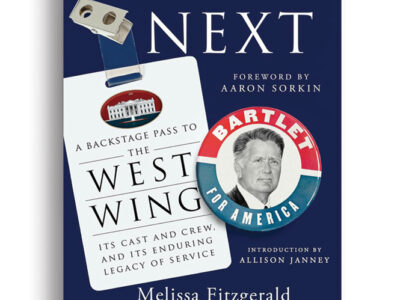
A new generation of Penn alumni is shaping New York’s political landscape.
By Jordana Horn Marinoff
It is just after six p.m. on Election Day, November 8, and though New York City Council Democratic candidate Dan Garodnick L’00 might not admit it, even to himself, he is just the slightest bit nervous.
He shifts from foot to foot in his dark suit, moving back and forth. He’s entitled to some discomfort—he’s been standing at the corner of 75th Street and Third Avenue for more than 11 hours, keeping a respectful distance from the polling place where he expects the highest number of votes to be cast in what he hopes will be his City Council District: District Four, from 14th to 97th Street on the East Side. In the course of his campaign, he’s estimated, he’s stood by subway stops at rush hour all over the East Side, shaking approximately 2,500 hands a day. What’s a few more now? Three hours until the polls close. He’ll be here.
Winning this race would be the culmination of everyone’s expectations for him, since, possibly, birth. The son of a New York City public schoolteacher, Garodnick was president of his high-school class at the Trinity School in Manhattan, studied government as an undergraduate at Dartmouth (where he was also class president each year), and edited the Law Review at Penn Law. “It was clear from the first time anyone met Dan that he was going to go into politics—and make his alma mater proud,” says Michael Fitts, the Bernard G. Segal Professor of Law who serves as dean of the Law School. “He always had a warmth and an ability to connect with people, wherever they stood on the political spectrum.”
A litigator at Paul, Weiss, Rifkind & Garrison, where he’s done pro bono work for 9/11 survivors and the New York Civil Rights Coalition, Garodnick has been endorsed by The New York Times for his “experience and mastery of the issues,” and by Senators Hillary Rodham Clinton Hon’93 and Chuck Schumer, former mayor Ed Koch, and former governor Mario Cuomo. He has immersed himself in the issues of education, affordable housing, and better transportation on the East Side, championing the near-mythic Second Avenue subway line.
“Hi, I’m Dan Garodnick and I’m running for City Council for this district,” he says with a bright and energetic smile, as though he’s saying it for the first time. He extends his hand to an approaching elderly pedestrian. She looks at him, smiles, and takes his hand in hers.
Welcome to Big Apple politics, where if the candidate didn’t attend Penn, chances are the person trying to get him or her elected did. New York has always been a haven for Penn graduates—some 40,000 Penn alumni now reside in the greater New York City area—and a new generation of Penn alums are increasingly making their voices heard in the city’s politics, at various levels and in both parties.
Garodnick is running for the seat occupied since 1999 by Eva Moskowitz C’86, the one City Council member to forego sure re-election by running for the office of Manhattan Borough President. This time she didn’t get past the primary. Though it was a rough loss, she doesn’t regret having taken the chance to aim higher.
“I was told by many to hold onto a safe bet, but that’s just not my style,” she says in an interview. “Loss is a necessary, but unsavory, part of the democratic process.”
For Moskowitz, being part of that process in City Council began after her work with Prep for Prep, an organization that works to identify talented minority students and prepare them for independent schools.
“Prep for Prep was a major motivating factor for my entry into public life,” says Moskowitz, a former professor of American history at Vanderbilt University, the University of Virginia, and the City University of New York. “I was shocked by the tragic disparity in the delivery of educational services across the racial and socioeconomic divide. To this day, expanding access to excellent public education for every child in New York City is the primary reason I go to work every day.”
Moskowitz cites among the high points of her work on City Council the more than 100 hearings she held on the city’s public-school system. In the fall of 2003, as head of the Council’s education committee, Moskowitz held five days of hearings on principals’, teachers’, and custodians’ union contracts.
“These labor agreements affect virtually every aspect of school operation, and had never been discussed publicly before,” Moskowitz says. “Although I was praised by some and criticized by others for taking a close look at what had previously been a taboo subject, I do feel that engaging the public in that discussion had an ultimately positive impact on the school system. For decades schools have been run under the iron grip of factory-model contracts that didn’t serve the best interests of teachers and students.”
Moskowitz often found herself at odds with various city politicians, including Mayor Mike Bloomberg, in such disputes. But from her point of view, there are no hard feelings: “We’ve been known to have our spats, but I endorsed [Bloomberg] and think his dedication to public education in New York City is unique and very sincere,” Moskowitz says. “I also have a rule not to personalize disagreements.”
Her sole disappointments in her City Council tenure? “The low point, I’d say, is feeling at times that change comes far too slowly, and at others that true independence is somehow a liability in politics.”
Moskowitz will continue to be involved in public-education—now in a much more hands-on way. In January, she begins work as the executive director of the Harlem Success Charter School, one of six charter schools that the New York State Board of Regents approved in December.
On a beautiful August evening, the Penn College Republicans hold their summer networking session in New York. The setting of Jennifer Saul Yaffa C’92’s gorgeous Fifth Avenue apartment —a jewel box overlooking Central Park—is the quintessence of the Upper East Side, the most heavily Republican area in Manhattan. Yaffa is the Republican National Committeewoman for the state of New York, and graciously invites the 12 or so Penn undergrads, in New York for their summer jobs, into her home. The elevator door into the apartment opens soundlessly, and in walks Lolita Jackson EAS’89.
Jackson is smart, funny, and dynamic—the person with whom everyone in the room wants to talk. As a black Republican woman under 40, she’s something of an anomaly.
In 2003 she became president of New York’s Metropolitan Republican Club, the oldest and largest Republican club in New York, founded by Teddy Roosevelt supporters in 1902. The club is the ancestral home of Rockefeller Republicanism, and past members include Nelson Rockefeller, John Lindsay, Jacob Javitz, Rudy Giuliani, and Mike Bloomberg. Jackson is the first African American to head the club.
“It’s hard being a black Republican, for sure,” she acknowledges, “but I don’t get grief from Republicans. Not at all. If anything, I think I got a seat at the table because people didn’t care about any of that. I am, and always have been, a very hard worker, and since we are so outnumbered in New York City, anyone who works hard can eventually have a seat at the table.”
Jackson grew up outside New Brunswick, New Jersey, and was accepted to every school to which she applied for college, earning full financial aid to attend the School of Engineering and Applied Science. “Then I was told by people that I had been accepted because I was black and I was poor,” she says, shaking her head. “I wanted to find a way out of my situation, and I did it myself.” Armed with her degree, she worked in New York finance for 13 years, most recently as a vice president at Morgan Stanley, before switching to a career in politics.
“I found that the Republican Party believed in individuals, not in government providing for you,” Jackson says. As she told New York Magazine in a profile last year, “I’ll stay out of your bedroom if you stay out of my wallet.”
She will readily admit that she had no interest whatsoever in becoming involved in politics until 1994. Rudy Giuliani had just won the mayoralty a year before, and Congressional and gubernatorial seats were just about to turn Republican. Republican City Councilman Charles Millard was campaigning at her subway stop.
“I had no idea what party he was,” she confesses. “I took his flyer because he was good looking! When I read it, I realized he was the same type of Republican I was: socially liberal and fiscally practical. I was hooked, and became involved in the campaign.”
Jackson wrote Millard’s position paper on welfare reform, and was swept up in the adrenaline rush of political action. “I would imagine it was very similar to how the ‘Deaniacs’ felt—we really believed in the candidate, and it was very exciting to be involved at that time.
“We lost that race, but won everything else—Senate, the House, the governorship, and all the other local races, including State Assembly and State Senate,” she recalls. “It was a watershed moment, and it happened my very first year in politics. I thought it would be like that all the time—little did I know … But being involved in that campaign made me realize that I could make a difference and that my voice could be heard.”
Jackson is also a member of the Republican State Committee as well as the district leader for part of the Upper East Side. As the district leader of Assemblyman Jonathan Bing C’92’s district, she says laughingly, “one of my main roles is to defeat him at the polls every two years. In spite of that, we’re friends, as we were both involved in performing arts while at Penn.” Because of the Penn connection, she also counts Garodnick among her friends, despite party differences.
In 2004, Jackson was appointed to the New York delegation for the Republican Convention. “Since I was the only delegate out of all 5,000 who survived 9/11 [“Alumni Voices,” November/December 2001], I actually became a convention spokesperson, and conducted many interviews with national and international press,” Jackson says. “I was also in charge of the New York delegation’s community-service project, where we helped on a Habitat for Humanity project in the Bronx alongside the Arkansas delegation. The convention was great, and helped solidify the desire to work in politics as a career.”
After being a “high-level” volunteer for 11 years, Jackson was named the Manhattan borough coordinator of the Bloomberg mayoral campaign, charged with implementing the grassroots strategy for “taking Manhattan,” which ranged from setting up events and organizing volunteers to leading the Get Out The Vote effort on Election Day.
Election Day finds her in the Metropolitan Republican Club room in a long-sleeved T-shirt and jeans, listening to jazz and manning the phones and computers amid a slew of Mike for NYC! signs, buttons, and paraphernalia. By evening, she seems a little tired, but her enthusiasm is unflagging. The vote has, effectively, been gotten out.
A half hour after the polls have closed, she’s making her way through the throngs of people in the Sheraton New York Hotel & Towers ballroom, coming into the Bloomberg victory party she knew would happen. Not only did Bloomberg win, but his 20-point margin of victory over Democratic opponent Fernando Ferrer was the largest ever by a Republican candidate in New York City. Now Jackson’s necklace sparkles, her smile is bright, and she gives no impression whatsoever that she’s been working since the wee small hours of the morning. Somewhere in the crowd, she’ll find some fellow Penn grads, among them Bloomberg communications director Ed Skyler C’95 and opposition research point person Stu Loeser C’95. She moves on into the crowd to meet, greet, and celebrate.
Though Jackson had intended to start her own political-consulting business after the November election, the Bloomberg administration had other plans for her. Last month, she was appointed the Manhattan commissioner of the New York City Community Assistance Unit. In that post she will serve as the mayor’s chief liaison to all community-based organizations throughout the borough of Manhattan.
Despite the seeming inevitability of Ferrer’s crushing loss, Jef Pollock C’93 readily characterizes his work as Ferrer’s pollster as “a long-time labor of love.”
“When Ferrer won the Democratic primary with 40 percent of the vote, I was so proud of him and so proud of what the team had achieved,” says Pollock, head of the New York- and Washington-based Global Strategy Group.
“It was a great moment to cherish,” he says. “Then we walked into an $80 million buzz-saw named Mike Bloomberg.”
Pollock has been Ferrer’s pollster since 1997, running all of the quantitative and qualitative research for his campaign. His job consists largely of targeting—figuring out which voters the candidate should talk to or avoid—and sculpting the candidate’s message.
“As a New York City-based consultant, though, when you work on a race in your home town, it’s never quite that simple,” Pollock says, citing his other function as general spinmeister. “A mayoral race can become all consuming—just ask my wife or daughter how much the phone never stops ringing, the conference calls keep going late into the night, and more.”
That said, “I love New York City politics and wouldn’t trade it for the world,” Pollock says. “My wife [Deb Brown, C’93] and I have lived and worked in both New York and D.C., and enjoy being ‘outside the Beltway.’ I think it gives me a real perspective on how things are playing outside of D.C.
“I love the fact that most of our friends are not in politics here,” he adds. “In D.C., that’s an impossibility. But the politics here are serious, and certainly bare-knuckled. It reminds me of being back in my native Philly sometimes.”
Pollock is a long-time Democrat, but it took Republican pollster Frank Luntz C’84’s “Candidates, Consultants and Campaigns” class at Penn, which Luntz taught in the early 1990s, to spur his interest in becoming a political pollster.
“I’d always loved politics, but [Luntz’s class] taught me to love polling,” Pollock says. “Frank and I didn’t agree on anything politically, but I learned about the art of language and how message can make a huge impact in campaigns.”
His experience at Penn also showed him how important it was to convey that lesson to students. Pollock currently teaches a similar class in polling as an adjunct professor at Columbia University’s School of International and Public Affairs.
For most political consulting firms, the “odd years” are down time between prominent races. Not so for Pollock, who was involved in many races “downballot” in Virginia, New Jersey, Pennsylvania, Ohio, and California in addition to Ferrer’s. His current projects include Eliot Spitzer’s New York gubernatorial bid, Chet Culver’s gubernatorial bid in Iowa, and the upcoming U.S. Senate race in Tennessee, whose Democratic candidate is one Harold E. Ford Jr. C’92.
“Election Day is probably the greatest natural high, or low, on the planet, in my opinion,” Pollock says. “More than anything, I enjoy attempting to elect good candidates, and good Democrats who I believe will serve us.
“In order to be in this business and not get cynical, you have to know that you are making a difference for people that can impact their lives,” he adds. “There is no doubt in my mind that what we do actually matters.”
Republican U.S. Congressman Vito Fossella W’87 is on the opposite side of most issues from Pollock, but he’d agree with the idea of making a difference. “I chose public service because I felt that you could make a positive difference,” he says. “Don’t just stand on the sidelines and complain. Step up to the plate and do something about it.”
Fossella may have been programmed to do so genetically: His great-grandfather represented Staten Island in Congress from 1935 to 1944, and his uncle was a New York City Councilman who lost his seat to Susan Molinari in her first bid for elected office. In 1994, Fossella won a special election to replace her on City Council when she went to Congress, and in 1997, he got to Congress himself, representing New York’s 13th Congressional District, including Staten Island and certain Brooklyn neighborhoods.
As the sole New York City Republican in Congress and a staunch conservative, he laughs when asked about his experience working with the city’s other congressional representatives. “We have a quality delegation, I’ll say that,” he says. “You learn to work well with others to the extent that you can. You try to find areas of common ground.”
Since Giuliani’s election in 1993, the blue city has progressed under (at least nominally) red leadership at the mayoral level. Are there more closet Republicans in New York than New Yorkers might want to admit? Fossella laughs again.
“I think voters and citizens should be given more credit—people are wise to choose elected leaders, especially for mayor, who put governing principles and ideas above party politics and partisanship,” he says. “Just getting the job done, being accountable, and having integrity—those are qualities that don’t belong to just one political party.”
He’s not laughing, though, when questioned about whether he—as an article in The New York Times hinted—is interested in Bloomberg’s job down the road.
“My focus is on the job I’ve been elected to do: to represent Staten Island and Brooklyn,” he says. “I am humbled by the trust people have placed in me, and that is my focus.”
On September 11, 2001, Fossella was at Newark Airport, boarding his 9:15 a.m. plane to head back to D.C. From the window of the plane at the gate, he could see the smoke billowing from the World Trade Center site—where he himself had worked in finance before attending law school. The plane was grounded, and Fossella found his way to Ground Zero within hours.
“Almost 10 percent of the people killed on September 11 were from Staten Island and Brooklyn,” Fossella notes. “I knew many of these people. They went to my high school, they belonged to my church. Some of their kids are on my kids’ soccer teams. It really puts a human face on it.
“We have an obligation to those families,” he says. “We owe it to them to demonstrate that our country is strong and vital. I think the men and women in the armed services in Afghanistan and Iraq are carrying it in their name and their honor. At the end of the day, the United States remains the beacon of light.”
It’s almost 10:30 p.m. on Election Night, and the crowd at the bar Remedy on Second Avenue and 51st Street is packed body-to-body. The “Garod Squad,” as Garodnick’s supporters jokingly call themselves, are out in full force to celebrate. Garodnick has captured 63 percent of the vote to his opponent’s 35 percent, and his political future, at least for the next few years, is set and raring to go. Garodnick enters the bar with his beaming parents, and the applause ripples from the front to the back of the room as word travels that the new City Councilman has arrived. Garodnick hugs everyone within sight, with a special word of individualized appreciation for each person, acknowledging their contributions, their volunteerism, their time—ever the politician. He is definitely more relaxed, and his smile now borders on a happy grin. Unlike Robert Redford’s famous closing line in The Candidate—“What do we do now?”—it’s clear that the only question here is what he will do next.
Jordana Horn Marinoff C’95 L’99 is a lawyer and writer living outside of Philadelphia. She can be reached at [email protected].




